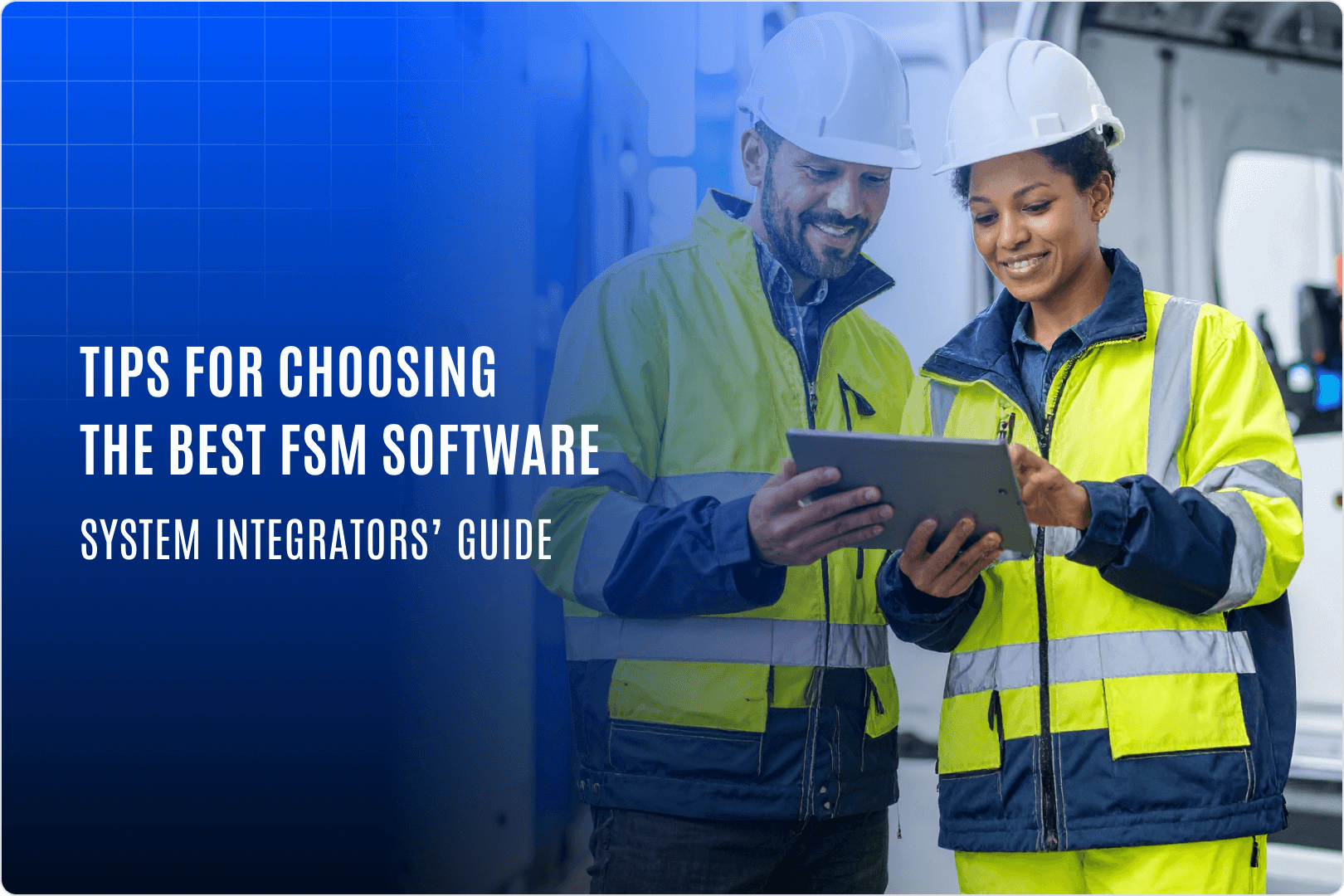5 Essential Tips for Choosing the Best Field Service Management Software: System Integrators’ Guide

Choosing the best field service management software isn’t just about ticking checkboxes. For system integrators, it’s about finding a solution that fits both current client needs and future growth. With so many FSM tools in the market, knowing how to choose the right field service management software is critical.
This guide gives you 5 actionable tips for choosing the best field service management software—so you make a decision that benefits both your business and your clients.
1. Prioritize Mobility: Field Teams Need Real-Time Access
It is impossible to effectively monitor and manage the field workforce without a mobile app. A key tip when choosing your field service management software is to ensure it fully supports both managers in the office and technicians or field employees on the ground.
Desks don’t fix field issues, but mobile apps do. Your clients’ field workforce need quick access to job details, customer information, location data, and communication tools.
Think of it this way:
Field employees are out there climbing towers, servicing AC units, fixing routers, and delivering assets, and they don’t have a mobile app to stay updated on their assigned tasks, real-time schedule changes, and urgent notifications.
When evaluating a solution, ask these questions:
- Can technicians update task progress, add notes, and log hours directly from their phones?
- Does the app allow for real-time sharing of photos, customer signatures, and precise location data from the job site?
- Is the mobile app actually usable, or is it just a sad, laggy extension of a web portal?
- Does the mobile app have an offline mode? Can field staff view job details, capture data, and complete forms without an internet connection, with data syncing automatically once connectivity is restored?
- How does the app perform regarding battery consumption? Is it optimized to prevent significant drain during a full workday, even with features like GPS tracking enabled?
Remember, mobility is no longer a bonus feature. It is the absolute foundation, and a primary tip for choosing any modern FSM software is to test its mobile performance thoroughly.
2. Look for Real-Time Monitoring
One of the top tips for choosing the best field service management software is ensuring it offers real-time monitoring.
Field service can turn into chaos without real-time visibility. If your software can’t monitor tasks, employees, or job statuses as they happen, it is flying blind. And your clients? They’re stuck with guesswork.
The best field service management software should give you the following:
- Live location tracking of all field agents.
- Real-time task status updates.
- Instant alerts for delays or deviations
- A dashboard that is easy to understand.
A great field service monitoring software turns field chaos into controlled execution. It doesn’t just report the mess; it helps prevent it.
3. Think Scalability and Customization for Future Growth
Opt for a platform that is designed for growth. The right FSM solution today should effortlessly scale and adapt to your clients’ evolving needs, ensuring you’re never held back by technological limitations.
Imagine what happens when a 5-agent team becomes 50? Or when a client wants to track additional KPIs?
The field service management software you choose should scale effortlessly. That means:
- Add/remove users without extra drama.
- Smooth integration with other tools (ERP, CRM, IoT devices).
- Easy custom workflows, task types, and reports.
- White-labeling options, especially if you’re reselling or offering it under your own brand.
In short, don’t box yourself in. Choose a platform that grows with your clients—not the one that holds them back.
4. Focus on User Experience
Choose the software that provides the best user experience because the most powerful software is useless if no one wants to use it.
If you go to the market, you will find hundreds of tools offering hundreds of features to users who only need 10, then charge extra for the confusion.
But field teams aren’t software engineers. They need something that’s:
- Easy to adapt
- Clean UI/UX
- Minimal training requirements
If the field service management solution isn’t user-friendly, its power will not matter because nobody will use it.
Always insist on a hands-on demo. Run through a real-world scenario: Assign a task, upload a document, mark it completed, and escalate an issue. If you need a manual at every step, ditch it.
5. Look For Software with Strong Support and Regular Updates
Choosing a tool is not just about features, but what happens after purchasing it.
Here’s what your clients will need and what you should demand:
- 24/7 support that doesn’t ghost you after the first bug.
- Regular improvements and product updates.
- Dedicated account managers.
- Transparent pricing and upgrade paths.
Remember, you’re not just choosing a tool; you’re selecting a software partner who will protect your reputation as a system integrator.
Bonus Tip: Explore Reseller and Partner Opportunities
Many field service management software providers offer partner or reseller programs. For system integrators, these are invaluable.
Look for software that:
- Let’s you co-brand or white-label.
- Gives you a partner dashboard.
- Offers a share in subscription revenue.
You’re not just solving a problem but building a recurring income stream. And if your clients are happy, they’ll stick around for the long run.
Final Thoughts
Choosing the right field service management software is a strategic decision that directly impacts your client’s efficiency and your reputation as a system integrator. By following these tips, you move beyond just comparing feature lists.
You learn how to evaluate a solution based on its real-world usability, scalability, and the strength of the partnership behind it.
You aren’t just selling a tool; you’re architecting a solution for success. Making the right choice will streamline your client’s operations and solidify your position as a trusted, indispensable partner.






